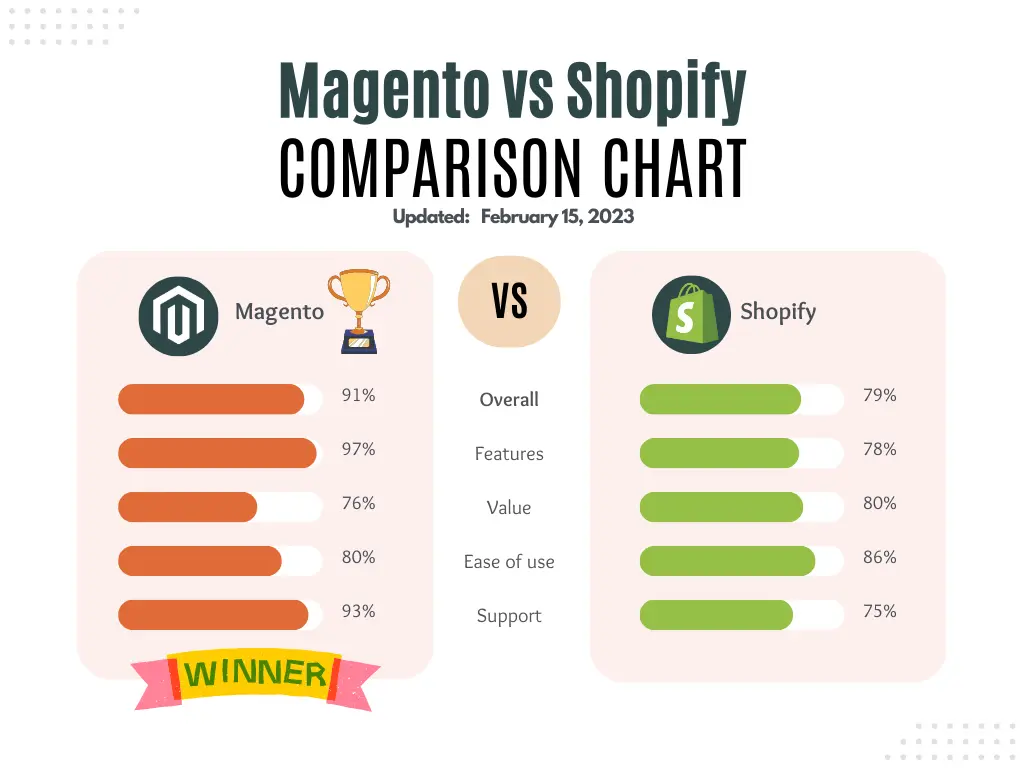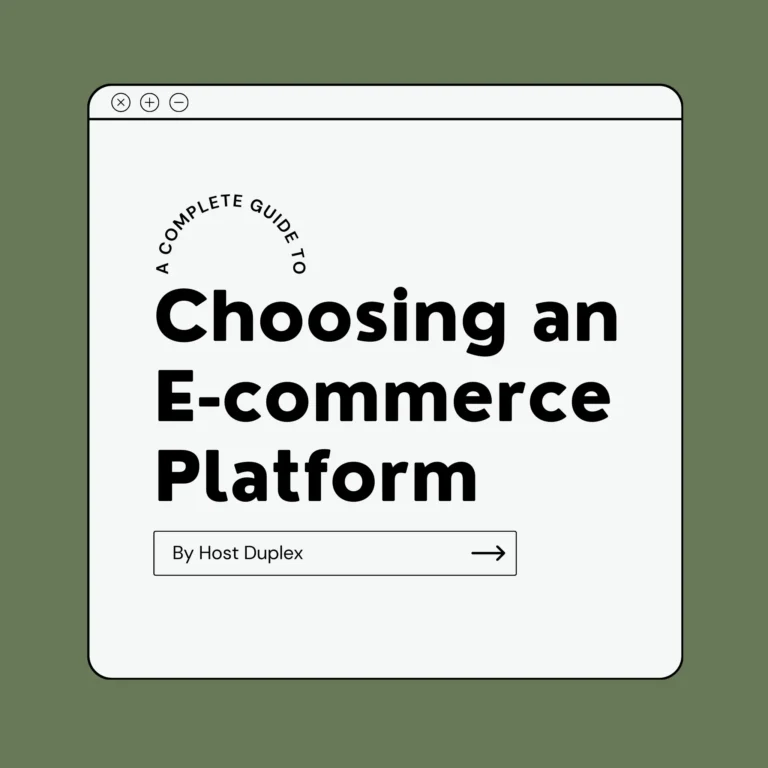Magento and Shopify are two of the most popular e-commerce platforms in the industry. These two e-commerce solutions provide feature-rich functionalities for online stores, ensuring maximum efficiency and performance. Let the Magento vs Shopify showdown begin.
Magento vs Shopify Summary
In the simplest terms:
- Shopify is best if you’re a small shop owner that doesn’t require much customization. Shopify provides an intuitive interface, has the lowest upfront costs, requires the least amount of technical expertise, and provides the quickest path to get a store online. It is hosted on Shopify’s own cloud-platform, and cannot be moved away from their hosted platform.
- Magento is the most powerful e-commerce platform and is suitable for all store sizes, especially for medium to large sized e-commerce stores. It has the best feature set of any e-commerce platform, and offers many advantages due the vast open-source community. It can be hosted at virtually any cloud hosting provider.
So, which is the better e-commerce platform when it comes to Magento vs Shopify? Let us find out!

Differences Between Magento vs Shopify
Features
Features directly impact the functionality and capabilities of an e-commerce store. It will determine how easily and effectively a store can be setup, managed, and scaled in the future.
Customizability
Magento is highly customizable. Users can customize nearly every aspect of their store, including the design, layout and functionality. It’s an excellent choice for business that require a unique look and feel for their online store. In comparison to Shopify, it’s quite often easy to spot a store using Shopify due to the way Shopify is designed.
Winner: Magento
Product Management
Magento offers multi-store capabilities, product types and attributes. For example, say you have two retail locations under different brands selling the same products. With Magento, it’s very easy to create a second store selling the same products. You can also define which products you want
the second store to sell, as well as define different options and variations.
Winner: Magento
Open-source
Magento is open-source, which means users have access to the source code of the platform. Since the world can see the source code, this allows integrations and customization straightforward. This provides a lot of flexibility and allows users to create a truly unique online store.
Winner: Magento
Performance
Magento is known for its scalability. It can handle large product catalogs and high traffic volumes. This is why many of the most well-known brand names of the world, such as Land Rover, Olympus, and Christian Louboutin, use Magento to sell their products. With the right Magento hosting provider, you can achieve extremely fast performance.
Winner: Magento (when using the right hosting provider)
Thanks to Magento being open-source, Magento has an extensive community of developers who provide support, guidance, and extensions. Extensions allow developers to integrate with Magento and provide custom features that you wouldn’t have with other e-commerce platforms.
Winner: Magento
User-Friendly Interface
Magento’s user interface can be described as more complex and technical than Shopify’s user interface. The Magento backed is organized into various sections, including Catalog, Customers, Orders, Marketing, and Content Management. It has quite a lot of features which, at first, can be quite overwhelming for new users.
Shopify’s user interface is much more intuitive and user-friendly, which makes setting up a store for non-technical a cinch. It has drag-and-drop functionality which allows users to easily customize their stores.
Winner: Shopify
Hosting and Security
Magento was designed with increased flexibility in mind. This includes being able to choose your own hosting and firewall provider. Magento users should vet their hosting providers and choose wisely. Starting a Magento store on a shared hosting could be risky. If another customer on your shared server gets hacked, you’ll be jeopardizing your clients’ data. We recommend choosing a provider with a strong track record of security, which is why we recommend Host Duplex for their strong track record of security and high-performance. Adobe recently announced Magento 2.4.6 which is set for release on March 14, 2023.
Shopify is the sole-provider of hosting for their platform, and they take care of all the hosting and security requirements of the online stores hosted on their platform. This means users have to less to worry about.
Winner: Draw (with the proper Magento hosting provider)
Support
Magento stores are only as good as your hosting provider’s support team. This is why we strongly recommend vetting your hosting provider and choosing a hosting provider, such as Host Duplex, that offers real 24/7 support by phone or ticket.
Shopify, equally offers 24/7 support by phone or ticket. Shopify, like Magento also has a large community of users who can provide and support and guidance to new users.
Winner: Draw (with the proper Magento hosting provider)
Pricing
Magento, users do not have to pay a monthly subscription to use the open-source edition. However, you must pay for hosting and a domain to build your website. Professional hosting can range from $99 per month and go into the thousands. We recommend avoiding the single-digit hosting providers. Users also have to pay for extensions, which are readily available for installation from the Magento App Market. Note that the price of integrations can range up to $15,000. There is also a paid Magento commerce software platform whereby users pay between $22,000 and $125,000.
Alternatively, Shopify has five subscription-based pricing tiers ranging from $9 to $2000 monthly. The monthly subscription fee includes hosting and domain costs. Likewise, Shopify themes and templates are more cost-effective than those from Magento. For instance, the best theme in Shopify costs $180, while Magento’s is $499.
Thus, it is safe to say that the Magento Open Source platform is more affordable for e-commerce stores as it offers free functionality. However, Magento stores still have to pay for integrations, enhanced security, and other exclusive features. On the other hand, Shopify is a subscription-based platform whose fees seem affordable on the surface, but users still have to buy apps and themes.
Winner: Draw
Marketing Functionality
When it comes to Magento vs Shopify, both platforms offer SEO-friendly functionality, which helps in increasing the general store ranking in search engines. Users can easily edit the page description, title, images, and schema markups to ensure that your web store ranks better on search engines like Google. Other marketing features available on these platforms include:
- Ability to create flexible coupons
- Creation of dynamic landing pages
- Managing newsletters
- Customizable email templates
All in all, Shopify wins in this category because of its in-built social media advertising feature. However, both Magento and Shopify offer impeccable marketing features.
Payment Options
While Shopify supports over 100 payment gateways, Magento offers more than 150 payment options. Depending on your Shopify pricing plan, you will have to pay a transaction fee for facilitating transactions between acquiring banks, issuing banks, sellers, and buyers. In addition, Shopify offers Shopify payments, which are easy to use and do not charge transaction fees. Shop Pay, another Shopify payment method, is available for Shopify users however with transaction fees ranging from 5-6%.
While Magento does not have any inbuilt payment processors, you can easily integrate with a payment processor by using an extension from the Magento App Marketplace and pay the relevant transaction fees. Some payment processors can run as low as 1.9% per transaction. Check with your local bank as many of them support the Authorize.net gateway.
When it comes to Magento vs Shopify payment options, Magento wins the cake due to it’s higher availability of gateways and better fees.
Bottom Line
When comparing Magento vs Shopify, if your goal is to get online as quick as possible, choose Shopify. It’s intuitive, easy to use, and requires the least amount of technical knowledge. If you plan on growing your business into something larger, choose Magento. quickest way to get up and running is with Shopify. with the Now that you understand the differences and similarities between Magento vs Shopify, it is time to choose the better option for your business. While Shopify is ideal for users looking to easily set up a fully-fledged online store, Magento is more suitable for those looking for complete control over their e-commerce stores and who have comprehensive coding skills. It is advisable to determine your business needs before selecting between Magento and Shopify.



Magento vs Shopify Made Simple: 13 Unique Differences You Need to Know